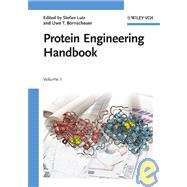
| Guidelines for the Functional Analysis of Engineered and Mutant Enzymes Engineering Enantioselectivity in Enzyme-Catalyzed Reactions | |
| Mechanism and Catalytic Promiscuity: Emerging Mechanistic Principles for Identification and Manipulation of Catalytically | |
| Promiscuous Enzymes Phi-Value Analysis of Protein Folding Transition States Protein | |
| Folding and Solubility: Pathways and High-Throughput Assays Protein Dynamics and the Evolution of Novel Protein Function Gaining | |
| Insight into Enzyme Function through Correlation with Protein Motions Structural Frameworks Suitable for Engineering | |
| Microbes and Enzymes: Recent Trends and New Directions to Expand Protein Space Inteins in Protein Engineering | |
| From Prospecting to Product ? Industrial Metagenomics Is Coming of Age Computational | |
| Protein Design Assessing and Exploiting the Persistence of Substrate Ambiguity in Modern Protein Catalysts Designing Programmable | |
| Protein Switches The Cyclization of Peptides and Proteins with Inteins | |
| A Method for Rapid Directed Evolution Evolution of Enantioselective Bacillus subtilis Lipase | |
| Circular Permutation of Proteins Incorporating Synthetic Oligonucleotides via Gene Reassembly (ISOR): A Versatile Tool for Generating | |
| Targeted Libraries Protein Engineering by Structure-Guided SCHEMA Recombination Chimeragenesis in Protein Engineering Protein | |
| Generation Using a Reconstituted System Equipping in vivo Selection Systems with Tunable Stringency Protein Engineering by Phage Display Screening Methodologies for Glycosidic | |
| Bond Formation Yeast Surface Display in Protein Engineering and Analysis In Vitro Compartmentalization (IVC) and Other High-Throughput Screens of Enzyme Libraries Colorimetric and Fluorescence-Based | |
| Screening Confocal and Conventional Fluorescence-Based High Throughput Screening in Protein Engineering 30 Alteration of Substrate Specifi city and Stereoselectivity of Lipases and Esterases | |
| Altering Enzyme Substrate and Cofactor Specifi city via Protein Engineering Protein Engineering of Modular Polyketide Synthases | |
| Cyanophycin Synthetases Biosynthetic Pathway Engineering Strategies Natural Polyester-Related Proteins: Structure, Function, Evolution and Engineering | |
| Bioengineering of Sequence-Repetitive Polypeptides: Synthetic Routes to Protein-Based | |
| Materials of Novel Structure and Function Silk Proteins ? | |
| Biomaterials and Bioengineering | |
| Table of Contents provided by Publisher. All Rights Reserved. |
The New copy of this book will include any supplemental materials advertised. Please check the title of the book to determine if it should include any access cards, study guides, lab manuals, CDs, etc.
The Used, Rental and eBook copies of this book are not guaranteed to include any supplemental materials. Typically, only the book itself is included. This is true even if the title states it includes any access cards, study guides, lab manuals, CDs, etc.